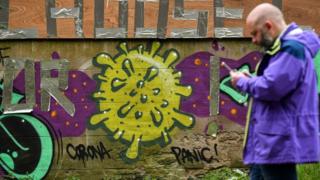 Image copyright
Getty Images
Image caption
Graffiti on a wall in Edinburgh
Image copyright
Getty Images
Image caption
Graffiti on a wall in Edinburgh
England, Scotland, Wales and Northern Ireland all have their own powers when it comes to easing the lockdown.
In Northern Ireland, groups of up to six people who do not share a household can now meet outdoors, with social-distancing measures in place.
But in England, the guidance is to meet only one other person outside your household outdoors.
The different policies are down to a number of factors, including geography, science and politics, experts say.
And as we "tiptoe out of lockdown", the lines between science and policy are likely to become ever more blurred.
How do rules vary across the UK?
Northern Ireland: "Groups of four to six people who do not share a household can meet outdoors maintaining social distancing." England: "You can meet one other person from outside your household if you are outdoors. Public gatherings of more than two people from different households are prohibited in law. There are no limits on gatherings in the park with members of your household." Wales: The advice remains to stay at home, except to go outside for food, health reasons or work (but only if is not reasonably practicable to work from home). "The overarching aim is that people should stay at home as much as possible. However, exercising outdoors is an important exception to this rule and is encouraged..." Wales' health minister is considering whether people should be able to meet loved ones not in their household outdoors. The next review of the rules is on 28 May. Scotland: The advice is similar to that in Wales. First Minister Nicola Sturgeon says her "route map" to lifting lockdown will be published on Thursday, with restrictions likely to be eased from 28 May. Image copyright Getty Images Image caption The "Stay home," message still appliesWhy do they vary?
Even within the UK, we should think of "a lot of different epidemics" rather than a single pandemic, according to Keith Neal, emeritus professor in the epidemiology of infectious diseases, at the University of Nottingham.
It is "quite reasonable" for Northern Ireland, which shares a border with the Republic of Ireland, to be out of step with the rest of the UK.
And studies suggests the reproduction (R) number, a measure of virus transmission, varies by region.
Image caption If the R number is above one, the number of cumulative cases takes off - but if it is below one, the outbreak eventually stopsIs the advice based on science, policy or both?
The UK government is advised by a panel of scientific experts, including epidemiologists, infectious disease modellers, virologists and medical doctors.
But Prof James Wilsdon, an expert in science policy, at the University of Sheffield, says the lines between evidence-based science and politics are becoming "very blurred" and this will increase "as we try and tiptoe our way out of lockdown".
There are "very difficult decisions to navigate" and the "cracks are starting to show".
Rowland Kao, a professor of epidemiology and data science, at the University of Edinburgh, says different governments have to consider "all sorts of balancing acts", when it comes to using science to inform policy.
"Policy decisions will inevitably be a mixture of scientific advice, an understanding of social and economic impacts and the ability to carry out any decisions," he adds.
Follow Helen on Twitter.

 5 years ago
816
5 years ago
816 

